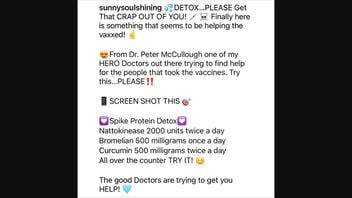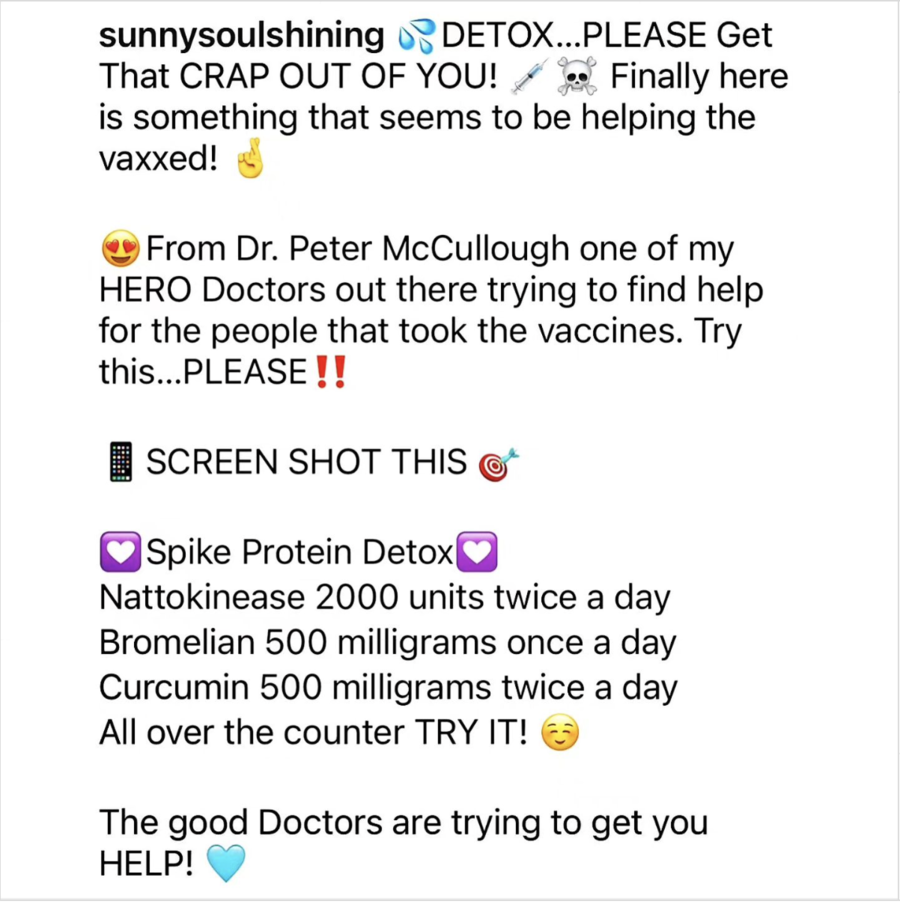Fact Check: Nattokinase NOT A Proven COVID ‘Spike Protein Detox’ NOR Has US Even Set Dosages — It’s A Food Supplement

Is nattokinase an effective treatment for “spike protein detox” associated with COVID-19 vaccines? No, that’s not true: COVID vaccines are not shown to be toxic, so it is not necessary to “detox” from them. Nattokinase is a soybean supplement that is not monitored in the U.S. and as of August 2023, experts recommend avoiding it. Furthermore, the study cited as proof was performed in lab cell cultures, not in people, so its results are not applicable to humans. Scientific evidence does not suggest that nattokinase can impact COVID vaccines, infection or the associated spike protein in humans, an expert told Lead Stories.
A version of the claim was shared in a post on Instagram published on August 7, 2023. Below is how it appeared at the time of writing:
(Source: Instagram screenshot taken Weds Aug 9 06:39:00 UTC 2023)
The above post implies that the supplement nattokinase effectively counteracts the SARS-CoV-2 spike protein, which enables the virus to infect human cells.
The claims are based on a Substack blog post published on February 21, 2023, (archived here) by Dr. Peter McCullough, a cardiologist who is affiliated with a website that sells nattokinase supplements.
In his Substack post, “Dissolution of Spike Protein by Nattokinase,” McCullough cited a 2022 study titled, “Degradative Effect of Nattokinase on Spike Protein of SARS-CoV-2” to argue that nattokinase can degrade the “Spike protein of SARS-CoV-2,” making it the “Holy Grail of COVID-19 Vaccine Detoxification.”
The caption on a video shared on Instagram on July 14, 2023, attributes to McCullough the following: “Nattokinase is the only enzyme we’re aware of right now that dissolves the spike protein.”
Kari Debbink, a molecular microbiologist and immunologist at Johns Hopkins Bloomberg School of Public Health, confirmed to Lead Stories that the 2022 study findings are not applicable to humans.
“This study was done in cell culture and does not tell us anything about what treatment with nattokinase would do in the context of vaccination or infection,” Debbink told Lead Stories in an email received on August 11, 2023.
“There are many things that can degrade a virus in cell culture that do not have any relevance to working the same way in a biological system for many reasons including toxicity, route of administration, [and] dose.”
The cited study was conducted in vitro — or in a lab setting — not in humans
Stanley Perlman, a professor of microbiology and immunology at the University of Iowa Carver College of Medicine, studies the development of coronavirus infections, including SARS-CoV-2. He confirmed that nattokinase may degrade the spike protein in a lab setting. However, “the concentration needs to be at a sufficient level and localized with the spike protein in the cell for degradation to occur.
“So, the science is correct, but the claim is exaggerated,” Perlman wrote Lead Stories in an email received on August 13, 2023. He added that the proteases, or enzymes that break down proteins, in nattokinase are “never present in sufficient quantities” to reproduce lab results (in vitro) in humans (in vivo).
“Similarly, there is no evidence (or expectation) that nattokinase will affect vaccine efficacy,” Perlman said.
Lead Stories searched through PubMed, the National Institutes of Health (NIH) online database that indexes a million biomedical and health-related scholarly titles, and found that there are no published animal models or clinical studies regarding nattokinase and SARS-Cov2.
“So, any claims that nattokinase could be used therapeutically in humans with SARS-CoV2 are not supported by scientific data at this point in time,” Debbink added.
HealthFeedback, a World Health Organization-validated global network of scientists fact checking health and medical news, reported that results from the study cited in McCullough’s post “may not reflect what happens in the human body.”
Supplements are not to be used for treatment unless under doctor’s direction
In an email to Lead Stories received on August 11, 2023, the Food and Drug Administration (FDA) referred us to the agency’s Dietary Supplement Ingredient Directory, “a webpage where the public can look up ingredients used in products marketed as dietary supplements and quickly find what the FDA has said about that ingredient and whether the agency has taken any action with regard to the ingredient.”
As of August 11, 2023, nattokinase is not included in the FDA directory nor is it authorized by the agency as a COVID treatment. The NIH Office of Dietary Supplements also does not include nattokinase on its website.
Dietary supplements are meant as additions to a person’s diet or lifestyle, such as vitamins or amino acids. The FDA warns that:
In general, even if a product is labeled as a dietary supplement, a product intended to treat, prevent, cure, or alleviate the symptoms of a disease is a drug, and subject to all requirements that apply to drugs.
Because nattokinase is not monitored or standardized by the FDA, quality and active ingredients in supplements may vary widely from maker to maker, making it difficult to standardize dosage.
The Federal Trade Commission has sent letters to companies and people promoting nattokinase as a COVID treatment, USA Today reported on July 21, 2023. Experts advise consumers to “steer clear of this product for now.”
McCullough is the Wellness Company’s ‘chief scientific officer’
The Wellness Company is an internet-based online store that sells supplements and “medicine your old doctor won’t tell you about.” McCullough is identified as “Internal Medicine, Cardiology Chief Scientific Officer” on the company website. Listed for sale on the company’s website is a product called “Spike Support,” a nattokinase supplement that sells for about $66.
Lead Stories has also reported that the COVID spike protein created in vaccines is not proven to be “hijacking” the human body’s DNA repair, that the CDC did not “just dramatically” change claims about mRNA vaccine safety in 2022, and that the spike protein in vaccines does not replace a person’s sperm.
This article has been archived for your research. The original version from Lead Stories can be found here.



